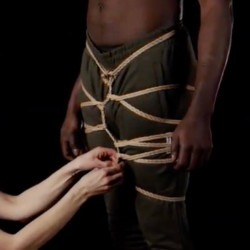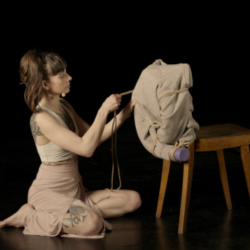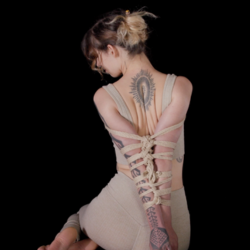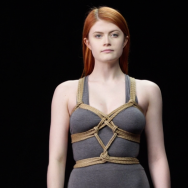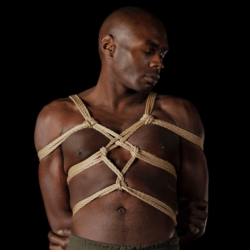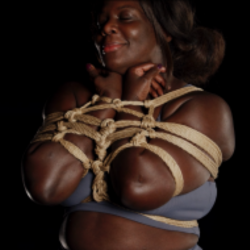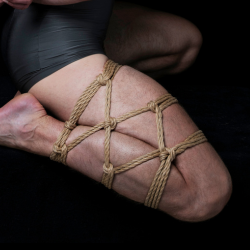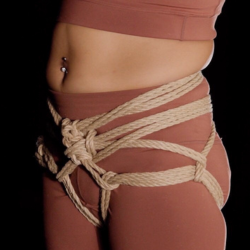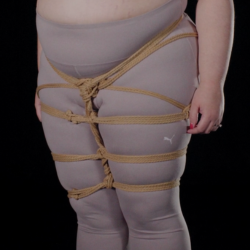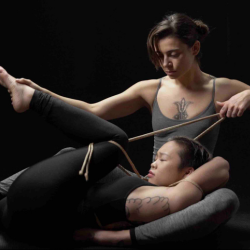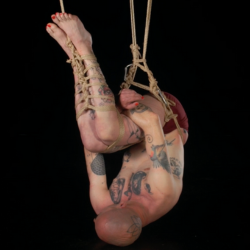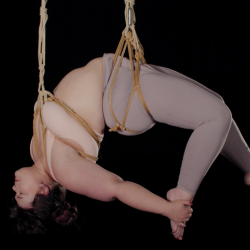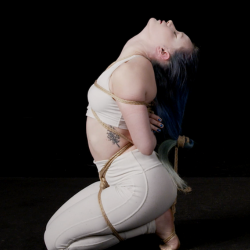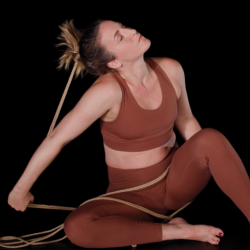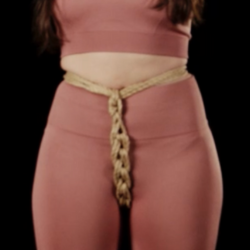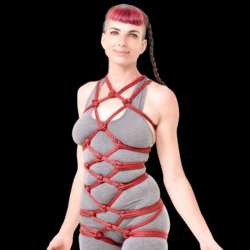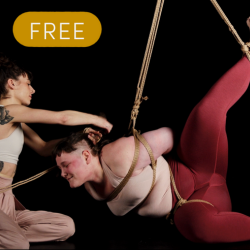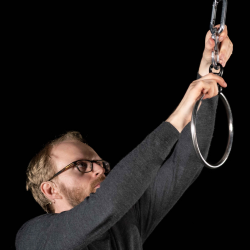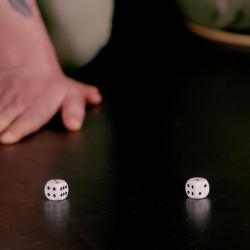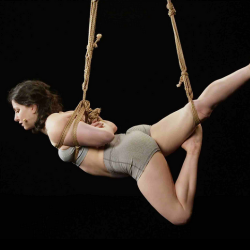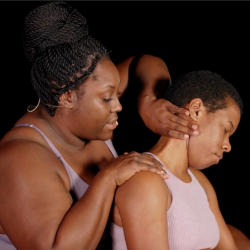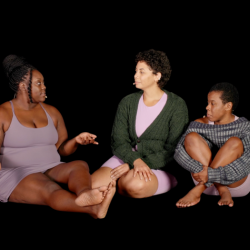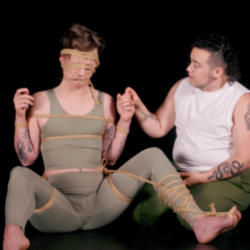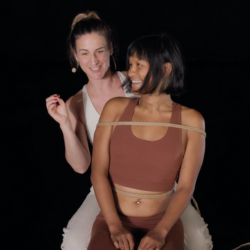EP 06
MISS TRUE BLUE
Listen in as Miss True Blue gives an insight into herself and talks about about safe(r) rope spaces and how to foster community.

Miss True Blue is a rope educator who discovered her fascination with rope in her early forties. She is the founder of VoxBody Studio, a dedicated rope space in Oakland that opened in 2017.
Wren [00:00:22] Welcome to the Shibari Study podcast. I'm your host Wicked Wren. Today I'm speaking with Miss True Blue. She's a community leader in the San Francisco Bay Area. She's a founding member of BARE, the Bay Area Rope Exchange. She's appeared on vice TV and opened VoxBody in 2017, navigating a closure and reopening through the Covid-19 pandemic. She's a rope switch and an advocate of the idea that rope bondage education should be aimed at both sides of the rope. Welcome, Miss True Blue.
True Blue [00:00:55] Thank you. Hi. Thank you for having me.
Wren [00:00:58] You are so welcome. Out of all the hundreds and hundreds of photos that I've seen, I think my favorite one that you've done is you tied this really adorable mango for a fragrance company a couple of years back.
True Blue [00:01:13] Oh, yeah.
Wren [00:01:15] And I thought that that was really cute.
True Blue [00:01:17] That was such a fun exercise because mangoes are tender. They bruise easily. So it was like a real exercise of figuring out how to get proper tension around that mango without liken destroying it. I'm pretty sure that person was doing that campaign in L.A.. So not only did I tie the mango and I think there was a zucchini and a couple other things. Eggplant, I think too. But then I had to ship them down to L.A., like overnight before they like spoiled.
Wren [00:01:52] Did you find that the consent conversations with the mango and the zucchini were different? Did they all have different meanings surrounding themselves?
True Blue [00:02:01] Of course, they did. Of course, they did. Every, you know, encounter is different, right? Mangoe's tenderness is very different than a zucchini's boundary.
Wren [00:02:13] Well, mangoes have kind of been through a lot, so I can see why.
True Blue [00:02:15] Yeah, I was going to say something about the thickness of the skin of the fruits and veggies. But anyway.
Wren [00:02:22] The eggplant has like a huge ego, I imagine, right?
True Blue [00:02:27] Oh, my gosh. Inflated ego of the eggplant.
Wren [00:02:34] Love it. So your name True Blue. It's from the preface of a Christopher Moore book, Sacre Bleu. And I want to read a little excerpt from that. He says, Blue is beauty, not truth. True blue is ruse, a rhyme? It's there, then it's not. Blue is a deeply sneaky color. Blue can be anything blue needs to be. And I was curious why you chose Miss True Blue.
True Blue [00:02:59] Oh, that's so sweet to hear that again. Actually, the name for me predates by decades. That book and me coming across that book. It started – I had a beautiful blue and chic-y ten-speed bike back in the nineties in San Francisco, and I rode my bike everywhere. And my bike was called Tuesday Blue. And then I graduated to a 1968 El Camino that was like midnight, metallic blue. It was the most gorgeous color ever. And that became Tuesday Blue. And then I became a burlesque dancer. And my stage name was Tuesday Blue. And I was actually part of the Black and Blue Burlesque Reveal. And that was the name of our troupe. And then I got the tattoo I have on my wrists, true blue, because those felt like two words I could live with for the rest of my life. I like those two words. I like the, you know, the saying or the loyalty that is implied. And then I encountered rope and kink and kind of dove into the scene and needed you know, at that point, I needed my like F*tLife name. And so I opted for True Blue. And then I think I encountered the book.
Wren [00:04:24] That is so cool. And I kind of figured that the book came at the end of it. What was it like being a burlesque dancer?
True Blue [00:04:32] Oh, my gosh, I loved it. One of the parts of my story for burlesque, which is similar to rope, is that I found these things, quote-unquote, later in my life than other people. Like, I was in my thirties when I got into burlesque and I was in my forties when I discovered my love of rope and kink. So that's definitely a different age bracket than a lot of people. And I felt when I discovered burlesque very grounded in a place of my life where I was like down for the celebration and tease and sharing of sexuality and expression and felt pretty damn grounded and like, I'm doing this for me approach to it where I was out in life and I loved being part of a troupe. I did some solo acts but really for me, it was always about when there was like five of us on stage doing something like really fun, silly, sexy choreography together. That was like what I really loved about it. And I had the opportunity to kind of like run away with the circus. During those years, we were part of a bigger band that kind of had a road show performed on Old Route 66, performed at the Great American Music Hall in San Francisco, like had some really epic moments.
Wren [00:05:53] It seems like that's a pretty natural progression to kink and rope bondage.
True Blue [00:05:58] Yeah, when you're moving forward, you don't really know what it is you're like barreling towards and then you look back and you're like, Oh, that totally makes sense that that's where that went. And the other part that really fits in, in retrospect is I was also a teacher and a librarian, and there's something about the librarian archetype that also makes sense to me that that all funneled into my finding rope and really like diving into this world.
Wren [00:06:28] When you found burlesque and you said you're ready for it in your life, what was the catalyst that got you there?
True Blue [00:06:35] A combination of going to a show of all women aerialist performance that I went to in San Francisco, and I was like, Oh my gosh, I want to try this. And there's a circus school in San Francisco. And I started taking some classes there, some like acrobats and static trapeze. And then it was also like the community of people that I was surrounded with at the time who were musicians and performers. I guess this is perhaps similar to what happens with some people with rope. You're doing it for fun and exploration at first, and then you're like, I really like this thing. I want to teach a class or I want to do a performance. And then you start to kind of carve out that part of it.
Wren [00:07:20] Yeah. It sounds like you've always been drawn to community and fostering community.
True Blue [00:07:25] Yes, that era of my life, going back to like the burlesque, being part of the show was one of my earlier experiences of like really strong community projects and efforts. So yeah, it's definitely been a thread for me that has carried into rope for sure. I absolutely love that personal and interpersonal rope, but I'm also obviously really interested in like how we create a community space around that and what it means to participate in like a scene or a network or a social network, whatever you want to call it.
Wren [00:08:04] Totally, yeah. Speaking of community, you founded Vox Body and it is a rope space in the San Francisco Bay Area. I think that it would help maybe to define what a rope space is, maybe what it isn't. What does it offer that isn't provided just at home?
True Blue [00:08:25] Right. That's such a good question. It's such a simple question too, I'm like, Where do I begin? On a really basic level, it was deciding to commit to a space. Finding the space, signing the lease and commit to opening the doors for folks to come in and primarily do rope. And you know what that means to do rope in a space that is a public space is going to mean a lot of different things. That's going to mean classes. It's going to mean jams and social time, performance events, meet-ups, kink education. And with that is going to come the like necessary framework of how is this space run? Who's helping to program and facilitate the events?
Wren [00:09:15] What kind of people do you see coming to your rope space?
True Blue [00:09:18] Well, I will say that we're pretty spoiled in the Bay Area with the depth and breadth of people that are here and want to explore rope and kink. It's kind of inherent in the history of the Bay Area. So I recognize that there's a bigger pool of folks interested in this in the Bay Area than elsewhere. One of the things that I do love about watching people walk in the door is that the age range will really be from early twenties into late sixties, early seventies. And that's kind of an unusual thing to see, like one practice draw that range of age. And we could do a lot better with this always. But I do also think that it draws in quite a variety of walks of life identities, orientations like what people do with their like, their lives otherwise.
Wren [00:10:22] Are there any intentional things you did to foster that kind of diversity in your space?
True Blue [00:10:28] I did intentionally sort of want to create a space that someone could walk into that maybe wasn't sure if they were into rope or kink, or maybe was a little anxious or a lot anxious and could walk in and feel comfortable in a way that maybe walking into like a dungeon your first time is going to be like. That's a big step, right? And it's very clear, like you are in a dungeon now. Like you've made that step. So I did intentionally want to leave light and empty walls and pillows and like a snack table. Things that might be like comfort zones that people could walk in and identify and feel like, okay, I can relax a little bit and sort out if this is a place for me. So just even thinking about the physical space is definitely intentional.
Wren [00:11:20] What are the standout snacks on a VoxBody snack table?
True Blue [00:11:25] Oh gosh. Well, so I'm just ramping back up with snacks because I haven't really been putting them out a lot because we've mostly been wearing masks since we got going. But in the old space, jelly belly. Jelly beans were definitely a go-to. We definitely had a tater tots area. We have definitely–
Wren [00:11:49] Don't we all?
True Blue [00:11:50] Don't we all have a tater tots era. We've definitely had some really pretty charcuterie trays, veggie snacks, Cheez-Its.
Wren [00:12:02] Wow.
True Blue [00:12:03] Yeah, always the dark milk, chocolate, peanut butter cups and the milk chocolate peanut butter cups from Trader Joe's. Those are like an always.
Wren [00:12:14] I love on your website how have VoxBody is a safe(r) space. And I think that's a really cool distinction. So just calling it a safe space.
True Blue [00:12:23] Yeah, that's definitely something that I learned along the way. And it is such a small change, but it carries a lot of weight and that is such a subjective thing. Whether a space is safe for one person to the next and that it's always a work in progress. We're learning as we go. So I think it indicates the process of being back.
Wren [00:12:46] Absolutely. And you think it has more power in the influence of the space, is that the hosts or the people coming into it?
True Blue [00:12:54] Oh, my gosh, I love that question. I want to answer both right away is what my gut wants to say. Also recognizing that I am the person that runs the space and has created the space and opens the doors to the space. So I already know that my influence and my presence there is like I recognize a power dynamic there and it is not the space it is unless anyone who walks in the door participates, comes back, turns around and welcomes in another new person and kind of show them around. We're really this time around, we opened in February, we've been really echoing the idea of community cultivating community. And so like what are the things that I can do as the person that runs the space or the people that are like the VoxBody volunteers or who work on certain teams or on certain aspects of the space. Like what are the ways that we can put it in the hands of anyone that walks in the door like, This is how we're doing this here. This is what we're doing here so that anyone can then turn around and like be representative of that. To your question, I love it and I want to say like both either, or, and. And I would be curious how a person who walks in the door would also answer that question.
Wren [00:14:21] I think it is a 50/50 thing. I think that makes total sense.
True Blue [00:14:25] Yeah.
Wren [00:14:26] You hosted a class during COVID called Calling You Back In group and rope jam. And that's really fascinating because it's described as a hybrid discussion rope jam. I thought that was really cool. What did – what does that class aim to accomplish?
True Blue [00:14:41] Yeah, we did a few of those right as I think we had signed the lease for the new space, but it wasn't open yet. But there was this anticipation of, Okay, we're coming out of two years of doing things online and not having in-person community. And now we're gearing up to come back into a space. And so we wanted to have some discussion around that. Like on a very personal level, like where are you at with like maybe you've been doing rope by yourself in your home for two years now.
Wren [00:15:20] Yeah.
True Blue [00:15:20] And like where is the part of you that is going to walk back into a space and do it in a public space to witness and be witnessed and partake in like a community experience. So we kind of wanted to generate some discussion and reflection on that. And there's also been this really interesting thing in the last few years where I think a lot of people have discovered or started doing rope in the last few years, which means primarily online and like I don't know about other towns and cities and places that there are so many more people doing rope right now in the Bay Area than there were in like February 2020.
Wren [00:16:03] Yeah.
True Blue [00:16:04] So that's really cool and exciting. And I think I'm also like super curious what all the variables are that fed into the fact that a lot of people are discovering rope right now and it's also like low key, worrisome. And you've been doing this inherently risky, vulnerable practice in your home by yourself, perhaps without any feedback from a teacher or anyone that could assist you. How's your rope? How are your consent practices? Where have you gotten them from and how is that going to translate into now we're going to come back into a community space together.
Wren [00:16:46] That's a phenomenal answer. And I think in closing, if you could leave us with a couple of things that people in their local groups can do to foster community, foster consent-based dialogs and things, since there are so many new people, that would be amazing.
True Blue [00:17:02] People will write to me and ask about this from like different pockets of the world that don't have established rope communities. And I think the first thing is just start small, do an event, or invite fill-in-the-blank people to your home to do rope. If that's like five or seven or ten people, whatever you can house and start there. And if that goes well, then plan another one. And if that goes well, then maybe plan a third and start to kind of articulate what are we doing here? Like what's the framework and how do we want to engage in this space together. And so start to build not just the events but the guidelines for like how are we going to do this together? I think that a lot of people are so hungry for community and events and spaces to exist and they, you know, want to go 0 to 100 and I think their like frustratingly Libra mom answer is like, Take your time and build it slowly and see because it is a space. If it is a community space, you want to kind of offer something and then see how that works for people that might walk in the door and do it. Did they respond to it in the way that you were hoping they would? And do they want more? And then you can build and build from there. Commit to the fact that if we are doing rope, then yes, it means let's learn the technique. What are the patterns and what are the knots and what are the frictions? But also like commit to the fact that this is a learning journey and communication and consent practices, anatomy, body mechanics, these are all these avenues that you're going to want to go down. So cultivate those as much as you cultivate. Look at this cool new tie I learned. And you don't need to reinvent the wheel either. There are a lot of consent resources out there. There's a lot of spaces that are articulating and re-articulating what that means for them and spending some time kind of poking around and seeing what other groups and spaces have done as their policies or the way that they run a space.
Wren [00:19:19] Totally.
True Blue [00:19:20] Yeah.
Wren [00:19:20] I want to thank you so much for talking with me. This is very insightful and I'm happy to hear that VoxBody is doing great after COVID and everything.
True Blue [00:19:29] Thank you so much. It was – time flew by.
Wren [00:19:33] Can you tell us where people can find you?
True Blue [00:19:35] Well, you can literally find us in Oakland, California, because that is where we are located. Online, our website is voxbody.com. We're on Instagram @VoxBody, Twitter @VoxBody, on F*tLife @VoxBody_Studio.
Wren [00:19:52] Blue, I want to thank you again for chatting. You're a wonderful person and I can't wait to see you soon.
True Blue [00:19:56] I will see you soon. I'll see you next month, yeah?
Wren [00:19:59] Yes, I can't wait.
True Blue [00:20:00] Yay. Thanks so much for having me and for doing this. I really appreciated the conversation.
Start your free 7-day trial
Get one free week of unlimited access at Shibari Study,
then pay from $17.90/month. Cancel anytime.


